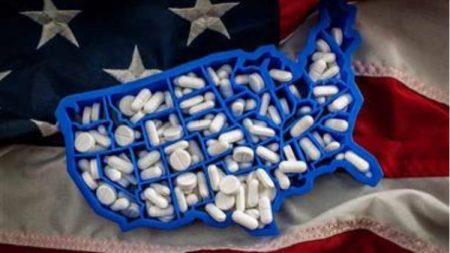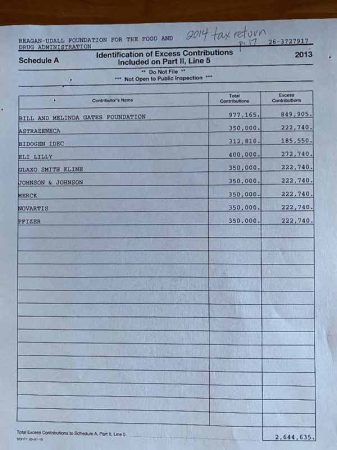
(Nov. 26, 2022) — If you’re like most people, you probably assume that the U.S. Food and Drug Administration is funded by the U.S. government and therefore isn’t catering to private industries.
The agency itself certainly tries to present itself as independent from the industries it regulates but, in reality, legal loopholes have led to the FDA receiving money from, and being captured and corrupted by, private interests.
While the FDA itself does not accept corporate money, it does receive money funneled via a nonprofit foundation, which in turn receives money from other nonprofits funded by private interests. It’s really all a façade because the end result is the same. Those donating the money ultimately end up with the ability to pull strings, when needed.
The Reagan-Udall Foundation
As explained by NPR1 back in 2012, the Reagan-Udall Foundation is a nonprofit foundation created by Congress in 2007 to support scientific research that is of interest to the FDA. According to NPR:2
“The idea was that this foundation could do things the FDA can’t. It would raise money from private sources, fund research in areas where the FDA lacks expertise, and organize collaborations involving industry, patient groups and academia.”
As explained in a 2008 article3 in the Journal of the National Cancer Institute, the creation of the Reagan-Udall Foundation was part of a larger plan to establish a private-public partnership to facilitate the Critical Path Initiative.
The Critical Path Initiative was part of the FDA’s attempts to streamline and modernize the drug approval process by having companies pay user fees. Part of the Reagan-Udall Foundation’s responsibilities was to set goals and priorities for the Critical Path Initiative, and then award grants to meet those goals.
Massive Loophole: Nonprofits Funded by Industry
However, critics voiced concern, saying the Reagan-Udall Foundation might allow the food and medical industries “to sway FDA decisions,” since it could raise money from private, including industry, sources. To quell some of these fears, the Reagan-Udall Foundation said it would only accept grants from government, individual donors and other nonprofits, not industry.
After a few years of scraping by on small, private donations, the foundation received a $150,000 grant from the PhRMA Foundation, another nonprofit foundation funded by drug companies. Being a nonprofit, the PhRMA Foundation fit the description of an acceptable funding source, but just how independent can it actually be when it’s founded and funded by drug companies?
As noted by consumer advocate Sidney Wolfe with Public Citizen, while the PhRMA Foundation is technically a nonprofit, “one can hardly expect that they’re going to do things that are not in the interests of their funders.”4
Indeed, and this influence is in addition to the influence food, drug and medical device companies already have, by way of user fees. Again, the Prescription Drug User Fee Act established an accelerated application process for new drugs. The sped-up process is funded through industry-paid fees.
This fee, however, works more like a payoff or soft bribe. When a company pays the FDA for an accelerated review, the agency no longer has an incentive to find fault with the product or demand more extensive testing.
FDA Foundation Funded by the Gates Foundation
Not surprisingly, the Reagan-Udall Foundation has received large donations from the Bill & Melinda Gates Foundation, which we now know rarely does anything that doesn’t benefit Gates’ personal bottom line and overall agenda.
As detailed in “Bill Gates — Most Dangerous Philanthropist in Modern History?” Gates has used his philanthropy to shape public policy in ways that benefit his own agenda.
A March 17, 2020, article5 in The Nation titled, “Bill Gates’ Charity Paradox,” even points out that the Gates Foundation has given $2 billion in tax-deductible charitable donations to private companies, including GlaxoSmithKline, Unilever, IBM, Vodafone, the Mastercard affiliate MasterCard Labs for Financial Inclusion,6,7 Scholastic Inc. and NBC Universal Media.8,9
Many of these so-called donations end up benefiting the Gates Foundation, as it also invests in the very same companies and industries that it donates money to. This circular economy is why Gates just keeps getting richer, the more money he gives away.
Part of this wealth growth also appears to be due to the tax breaks given for charitable donations. In short, it’s a perfect money-shuffling scheme that limits taxes while maximizing income generation.
If donating to for-profit companies sounds oddly illegal to you, you’d be right. Gates is a tax evader for doing so — he’s simply getting away with it. The nonprofit foundation is a disguise to avoid taxes while funding the research arms of for-profit organizations that his foundation is invested in, which is illegal.
The image below shows donations received by the Reagan-Udall Foundation in 2013. Topping the list is the Gates Foundation, whose contributions for the year amounted to $977,165, followed by a string of drug companies.

Board Members With Ties to Industry
In addition to all of this financial clout, food, drug and medical device makers also have the ability to exert influence over the FDA via the members10 of the Foundation board, and this was a concern right from the get-go.
As reported in the 2008 Journal of the National Cancer Institute article,11 members of the then-newly created Reagan-Udall Foundation executive board had troubling ties to industry — and to the Gates Foundation, which years later (see above) ended up being a top financial donor. The article, written by Joel B. Finkelstein, reads, in part:12
“The Food and Drug Administration’s most recent steps toward modernizing the drug approval process have renewed some old questions about the FDA’s relationship with the industries it regulates.
Several public advocacy groups affiliated with physicians and researchers have voiced their concern over the appointment of certain members to a newly formed agency board. The groups have warned that some members may have conflicts of interest due to past or current roles as board members of pharmaceutical and biotechnology firms …
The [Reagan-Udall] foundation’s board of directors, appointed by the FDA commissioner, will be largely responsible for establishing by-laws, selecting an executive director to oversee day-to-day operations, and reporting to Congress on foundation activities and operations.
The federal statute stipulates that of the 14 members named to the board, four members should come from industry, three from academia, two from consumer or patient advocacy organizations, and one from the health provider community. The remaining four spots are open to anyone with relevant expertise.
The FDA has already chosen the members and is organizing the Reagan–Udall Foundation. However, some advocacy groups are concerned that several nonindustry members have strong ties to pharmaceutical and biotechnology companies, including one who is currently under investigation by the Senate Finance Committee.
Tadataka ‘Tachi’ Yamada, M.D., currently heads the Bill and Melinda Gates Foundation’s global health program but until 2006 worked as head of research for the pharmaceutical company GlaxoSmithKline.
Senate investigators have uncovered evidence suggesting that, during his tenure with the company, he may have been involved in an effort to intimidate a scientist who was raising questions about the heart risks associated with the company’s blockbuster diabetes drug rosiglitazone maleate (Avandia).”
While the Reagan-Udall Foundation is the nonprofit arm of the FDA, the agency does not have the authority to set conflict-of-interest policies for the foundation.13 This, of course, leaves the door wide open for conflicts of interest and allows the Foundation to become a hidden back door of sorts, for corporate influence.
Read the rest here for a limited time or download:
For all of Dr. Mercola’s archived content, see his “Censored Library” (subscription required).

